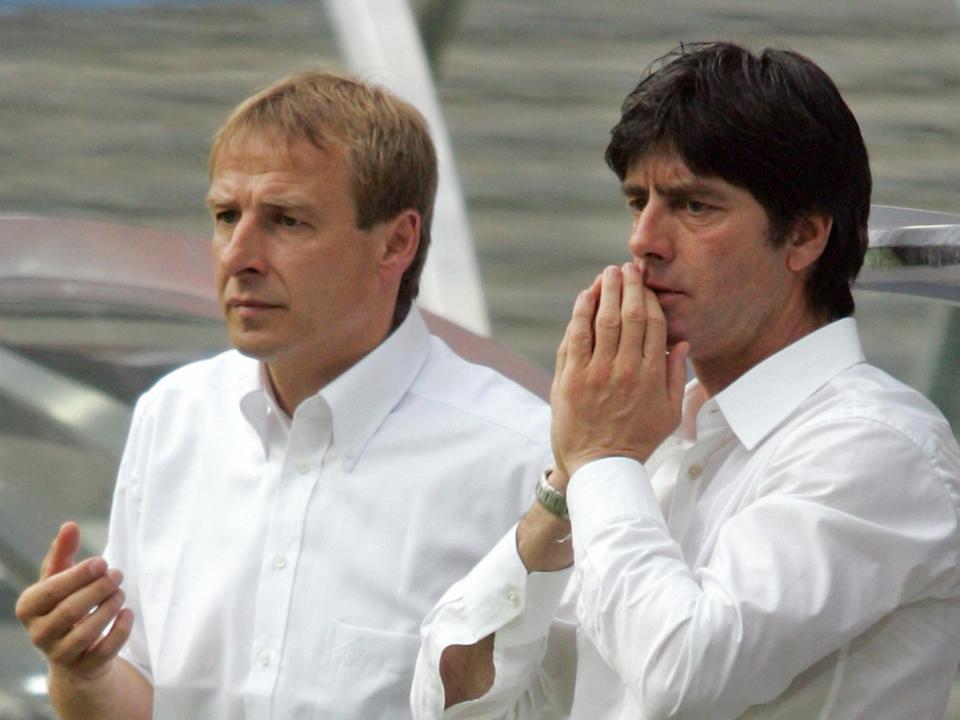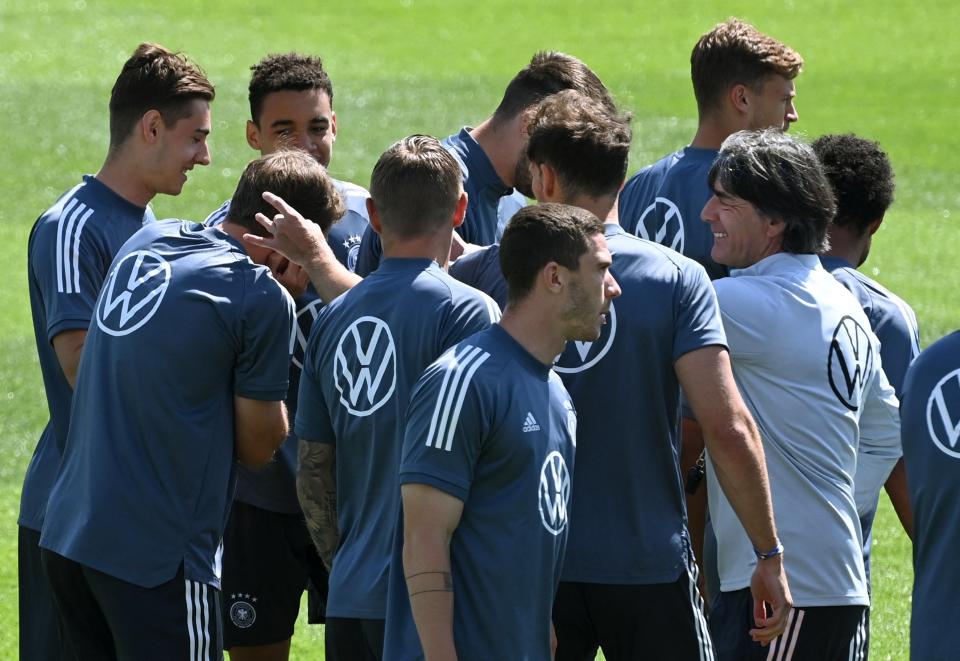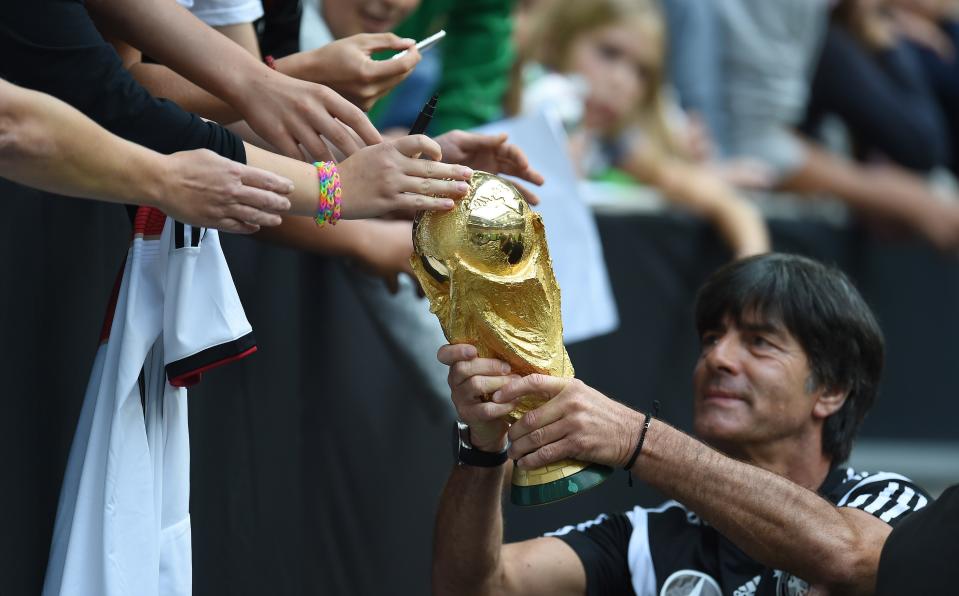Joachim Low began his Germany journey with Jurgen Klinsmann but must finish it alone at Euro 2020

In a matter of weeks, perhaps even days, this generation of the German national team will come to an end.
It is a generation tied to head coach Joachim Löw, but it owes much to Jürgen Klinsmann, who in many ways laid its foundations more than 15 years ago.
The arrival of the former Germany striker in die Mannschaft’s dugout in 2004 was heralded by a preceding period of infuriating inconsistency from the national team, a series of disappointments and heartbreaks that invigorated the German FA in their pursuit of der vierte Stern – “the fourth star” on their jersey following World Cup triumphs in 1954, 1974 and 1990.
Who better to lead Germany in their search for success than Klinsmann, a part of the 1990 title win in Italy and captain of the Euro 96-winning side in the same country? Who better to connect the national team to German supporters as the side entered a home World Cup in 2006?
Klinsmann, with Löw at his side, led Germany to the semi-finals that summer, restoring faith in the national team before abruptly departing in the aftermath and leaving his assistant coach to finish what the pair had started.
Both would have hoped that Löw would end Germany’s wait for a trophy, as he did by collecting der vierte Stern at the 2014 World Cup. Neither would have anticipated that Löw would still be in charge to this day.
With his exit imminent, however, as Hansi Flick prepares to begin a new chapter in the history of die Mannschaft, it is fair to ask whether Löw’s 15 years in charge have been a few too many. After the shocking group-stage elimination in the 2018 World Cup in Russia, hindsight begged the question: Should Löw have stepped aside in 2014, having completed the quest for the fourth star?
“I don’t think so, no,” Klinsmann says. “It’s normal that over a long period of time there will be ups and downs. My role model has always been Sir Alex Ferguson. How can you maintain throughout a long period of time, like he did, the same positive spirit, the leadership and the willingness to get every player to perform to their best capabilities?

“What Joachim did over the 15 years is outstanding. Obviously there was a big, big disappointment in Russia, but ultimately – no matter who the manager is – it is about the drive and the spirit of the players. If they really are hungry to the extreme to go for a championship or go until the very end of a tournament, they can do that.
“The manager is there at your side to help you get there, but really it is the players who make the difference.”
Many distant observers have believed for some time that Löw’s respective relationships with his players and with German fans have been strained, but Klinsmann offers a contradictory insight.
“Obviously there has been a lot of criticism of Löw because of the performance in Russia but, in general, people really like him a lot,” the 56-year-old says. “He’s a good person and the work he has done over 15 years has been very positive, obviously, with winning the World Cup in 2014.
“The people will always favour him for that and give him a lot of respect for what he achieved. They will wish him well for his last tournament and will always have a lot of admiration and respect for Löw, but on the other side in Germany, football fans will want to forget Russia, or will want to move on from that with a good performance from the team.”
But what constitutes a good performance from Germany at Euro 2020, considering their presence in the ‘group of death’ with world champions France, European champions Portugal and underdogs Hungary? Given the transitional nature of the squad, and the fact that their manager is rehearsing the lyrics of his swan song, surely some degree of pressure has been relieved.
Klinsmann, again, argues otherwise.

“Because of the culture that we have in Germany, the expectations are always the same – they come from the history of the German team, winning four World Cups and three Euros. The expectations are very simply defined: winning a tournament.
“It doesn’t matter if Jogi or Hansi is at the helm. Now, obviously, if you lose in the semi-final and things don’t turn out how you wanted but you played a good tournament, nobody gets mad at you. But those expectations to win are normal, you’re surrounded by them day-in, day-out.
“I think the expectations are maybe even extra high because of the disaster and disappointment from Russia, and I say rightfully so. It hurt a lot of people. It hurt a lot of people, the way they performed there – or didn’t perform. You carry that on your shoulders. It’s a generation of players that have to prove a point and correct something.
“Obviously the group they’re in is very good, but now you go through if you’re part of the four best third-placed teams, so you’ve got to get out of that group. It doesn’t matter who the teams in the group are, every team that qualified for the Euros is a good team.”
The expectations for Germany may be high back home, where the team will play all three of their group games in Munich, but fans in other countries would not be surprised to see Löw and his players stutter through Group F and perhaps out of the Euros in the last 16 – such is the perception of die Mannschaft following their catastrophic failure in Russia and a 6-0 thrashing by Spain in the Nations League last November.
Whether or not things have been as bad as they seem for Germany, something – somewhere along the way – has undoubtedly gone wrong for them.

“I think a national team, no matter what country, will understand it’s a lot about the internal dynamics, the inside atmosphere, the spirit that a group and federation has – the staff, everybody involved,” Klinsmann says. “The Americans say ‘programme’,” he adds, speaking from his experience as United States coach between 2011 and 2016.
“You’ve got to create a certain atmosphere and chemistry, which is even more difficult because of what we’ve experienced in the last year-and-a-half with Covid. It’s very tricky with all of these issues going on with Covid to have a spirit and atmosphere that is so driven and disciplined to go through six-seven weeks of a tournament and its preparation. It demands a lot of everyone involved.”
Many observers would suggest that the issues go back much further than the last 18 months, however. Many would point to the controversial exiles of Germany stalwarts Thomas Müller, Mats Hummels and Jerome Boateng after the 2018 World Cup – with Mesut Özil then quitting the national team while alleging racism and disrespect from some higher-ups at the Deutscher Fussball-Bund.
While there have been no returns for Özil or Boateng, Löw seemed to recognise the error in dropping Müller and Hummels, both of whom are in the coach’s squad for Euro 2020.
“They’re very good players, no doubt about it,” Klinsmann says of the Bayern Munich forward and Borussia Dortmund defender. “Reintegrating them is the right thing to do. You give Müller and Hummels the chance to come back, reintegrate and put their stamp on the team as leaders – because they’re not going on the bench. Now people in Germany say: ‘Okay, you’ve got the group together, now make it happen.’”
While Löw, 61, faced a squad selection headache as he considered whether or not to recall the pair, he now faces a headache over whom to name in his starting XI. Germany’s defensive contingent doesn’t inspire great confidence in the team’s chances this summer, but there are talented attacking options in the likes of Müller, Serge Gnabry, Leroy Sane and Kai Havertz – as well as Timo Werner, when he is at his best. Furthermore, die Mannschaft boasts as impressive a midfield as any nation at the Euros.

Real Madrid metronome Toni Kroos seems undroppable, despite his club’s meandering season last term – though Löw is, as is now evident, no stranger to bold calls. The 31-year-old should start in Löw’s side, in any case, with Ilkay Gündogan a possible partner after the Manchester City midfielder’s career-best campaign. Leon Goretzka of Bayern cannot be overlooked, however, leaving Joshua Kimmich in a strange position – quite literally.
Arguably the best midfielder Germany have right now, Kimmich’s versatility has seen him shifted to right wing-back recently as Löw attempts to solve the conundrum in the middle of the pitch and accommodate as many of his best players as possible. That said, Kimmich does have some experience playing on the right of a defence.
“I think Kimmich probably is one of our best players over the last three-four years,” Klinsmann says. “He’s grown into a leader role and does so much but is still very young. If you play him inside or outside it’s a very similar story to Philipp Lahm.
“How Löw wants to solve that depends on whether he wants to play a back four or back three at the end of the day. He has to keep everyone happy, but having Kimmich on such a high level is a huge piece.”
Keeping everyone happy is a task that Löw can only fulfil by winning Euro 2020. Those are the stakes, They have been laid out plainly by Klinsmann, a man with greater knowledge than anyone else of die Mannschaft, its overseers and its supporters.
At Euro 2020, Löw will end his journey with Germany – a journey he started alongside Klinsmann but must finish alone.
Read More
Germany Euro 2020 squad guide: Full fixtures, group, ones to watch, odds and more
France Euro 2020 squad guide: Full fixtures, group, ones to watch, odds and more
Portugal Euro 2020 squad guide: Full fixtures, group, ones to watch, odds and more

 Yahoo Finance
Yahoo Finance 